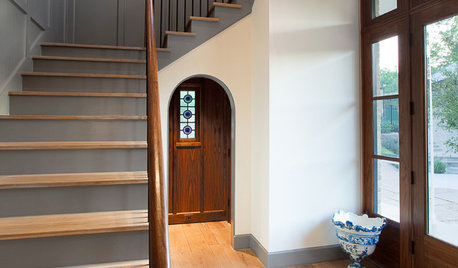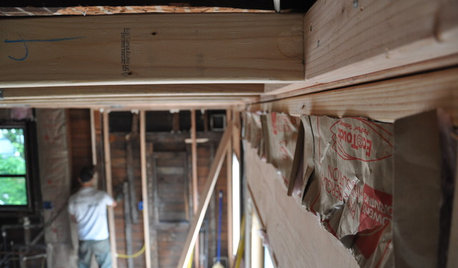Designer vs contractor
willowacres
9 years ago
Featured Answer
Sort by:Oldest
Comments (41)
User
9 years agoCharles Ross Homes
9 years agoRelated Discussions
Kohler vs Contractor's Wardrobe vs ??? shower doors
Comments (4)I have a set of Basco that are almost 30 years old, will be replacing this year, they are still in excellent shape except for some mineral discoloration/etching on the glass. Typical for glass doors this old. These are sliders on a tub/shower combo. I have another Basco door that is almost 20 years old on a shower. This door has stationary sides with an out-swing door. It looks as good as the day it was installed. I purchased both a bathroom fixture store. I have found that the quality in the bathroom/plumbing fixture store is much better than the big box stores. I will be replacing the older one with Basco....See MoreUsing a design/build firm vs using a kitchen designer and a contractor
Comments (2)The design build firms are going to be more cost focused. Not your needs focus. They may have a designer but this person is not really focused on what you want and need. Most likely the designer from the deign build firm is there to ensure you make choices so the build can start and the company can move on to the next project. I would go with someone who is there just for you....See MoreCrossroads- seeking professional advice
Comments (11)Your opportunities as designer-only are (in my experience, others may disagree): working as a sales-designer role for a design-build firm. This is the best money but it's far from a "cushy" design gig. You earn that money by managing projects during the day, running sales calls late afternoon/evening, and squeezing in design/estimating time whenever. If you're money motivated, you learn that telemundo has the best boxing matches on at 2 am. At one firm the #1 designer was on track to make $225k when I left (I was #2 which really irked me). Our #20ish designer might have made $15k (it was a BIG company). An advantage is that they supply all the leads, you just have to work them, and if they like you you can steer the marketing in the right direction. working as a freelance designer/hired gun for other contractors. Can make ok money, but you're in a weird spot when it comes to estimating and negotiating if you're working for multiple companies. It's also awkward when you get the same lead from multiple contractor daddies. independent landscape designer. Some people make good money this way, and some kick up a heck of a wake and don't move forward in the water at all. If ALL you want to do is draw, think about what you want to gross for the year and divide it by the # of designs you need to sell. You want to make $50k and your average design fee is $1,000? You need to sell 50 designs. Which means, realistically, you need at least 80-100 leads a year. You're the boss, so how are you getting those leads? Some designers project manage their jobs to supplement, but you need to be able to sell your value. Why are you worth an additional 20% on top of what the contractor is charging? And at the end of the job, when the neighbors are raving about how good it looks, are they asking for your #? Or the installer's? I agree w/ gardengal that the best money is getting the projects built. And the happiest I've ever been has been designing my own projects and building my own projects. The more control I have over the process, the better the end product. Get yourself a copy of this book: https://www.amazon.com/Thriving-Landscape-Designer-Management-Profitability/dp/0692522379 It's a super smart overview of three paths to being a successful landscape designer, and it may well help you decide your next move....See MoreDesign Center vs General Contractor - Help!
Comments (10)Probably you are having a good experience with this remodel because the design center is in charge and overseeing the project. I would stick with that. You'd have to make sure these guys have the right insurance coverage for every worker who enters your home, are pulling the right permits, doesn't put a sub on the job that you don't know and just shows up ones day, are scheduling the inspections, does the flood test, keeps the schedule rolling along without big delays, etc, etc, If something goes wrong, you won't have the design center boss to call. I'd stick with the design center....See Morewillowacres
9 years agoVertise
9 years agowillowacres
9 years agoJoseph Corlett, LLC
9 years agoVertise
9 years agolast modified: 9 years agoGreenDesigns
9 years agoVertise
9 years agoGreenDesigns
9 years agoVertise
9 years agojellytoast
9 years agowillowacres
9 years agoVertise
9 years agolast modified: 9 years agowillowacres
9 years agojellytoast
9 years agolast modified: 9 years agomillworkman
9 years agowillowacres
9 years agojellytoast
9 years agowillowacres
9 years agoMags438
9 years agowillowacres
9 years agoSue B Hooven
9 years agoMint tile Minneapolis
9 years agorenovator8
9 years agowillowacres
9 years agoVertise
9 years agorenovator8
9 years agolast modified: 9 years agoJoseph Corlett, LLC
9 years agorenovator8
9 years agojellytoast
9 years agorenovator8
9 years agolast modified: 9 years agoCharles Ross Homes
9 years agorenovator8
9 years agolast modified: 9 years agoJoseph Corlett, LLC
9 years agolast modified: 9 years agobry911
9 years agolast modified: 9 years agoCharles Ross Homes
9 years agorenovator8
9 years agolast modified: 9 years agorenovator8
9 years agobry911
9 years agolast modified: 9 years ago
Related Stories

REMODELING GUIDESContractor's Tips: 10 Things Your Contractor Might Not Tell You
Climbing through your closets and fielding design issues galore, your contractor might stay mum. Here's what you're missing
Full Story
REMODELING GUIDESContractor Tips: What Your Contractor Really Means
Translate your contractor's lingo to get the communication on your home project right
Full Story
REMODELING GUIDESContractor Tips: 10 Hats Your General Contractor Wears
Therapist, financial advisor, mediator — for the price of a single good contractor on your remodel, you're actually getting 10 jobs done
Full Story
REMODELING GUIDESContractor Tips: Advice for Laundry Room Design
Thinking ahead when installing or moving a washer and dryer can prevent frustration and damage down the road
Full Story
LANDSCAPE DESIGNHow to Find and Hire a Great Landscape Contractor
Get your landscape project built on time and on budget by hiring a quality professional
Full Story
WORKING WITH PROS7 Tips for Making Contractors Your Allies
For a contractor as vested as you are in your home project's success, follow these time-tested techniques from a professional designer
Full Story
REMODELING GUIDESContractor Tips: 10 Ways to Get the Remodel You Want for Less
Lighten the load on your remodeling budget without sacrificing your design by heeding this insider advice
Full Story
CONTRACTOR TIPSAn Expert Guide to Safe and Stylish Staircases
Understanding how stairs are designed and laid out can help you make the best decisions for safety and beauty in your home
Full Story
REMODELING GUIDESContractor Tips: Finish Your Basement the Right Way
Go underground for the great room your home has been missing. Just make sure you consider these elements of finished basement design
Full Story
REMODELING GUIDESContractor Fees, Demystified
Learn what a contractor’s markups cover — and why they’re worth it
Full Story






helsharmar